By Leen Randell
Updated: Jul 04, 2024
10 Best Herbal Decoctions For Oily Hair
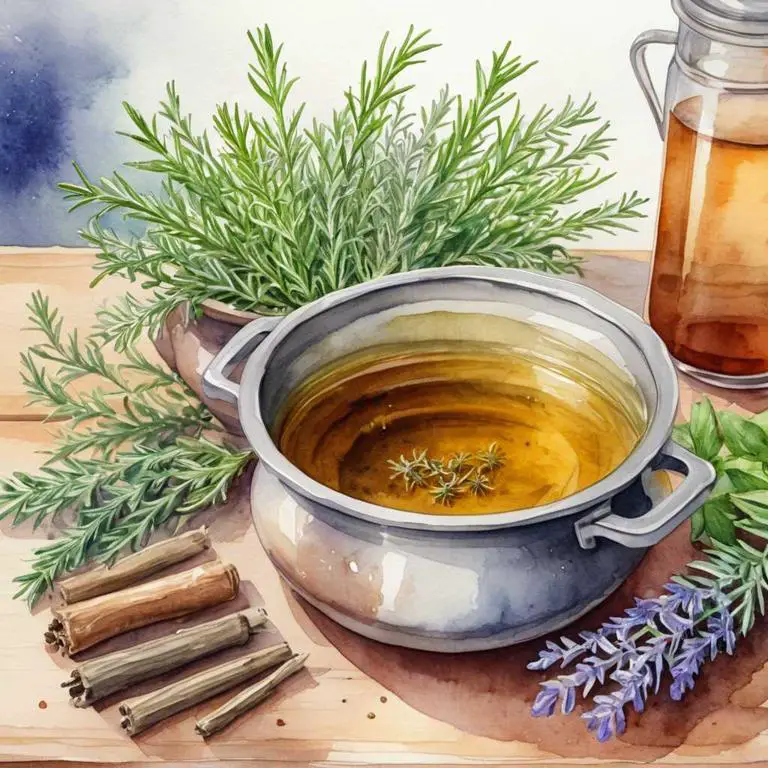
Herbal decoctions for oily hair are a natural and effective way to manage excess oil production, reduce dandruff, and add shine to your locks.
These liquid concoctions are made by steeping herbs like neem, tea tree, and chamomile in hot water, which helps to balance the scalp's pH level, reduce sebum secretion, and soothe irritations. For example, a decoction of neem leaves can help control oiliness while calming an itchy scalp, making it ideal for those with oily hair prone to dandruff.
By using herbal decoctions, individuals can enjoy healthier-looking hair that's less greasy and more manageable, ultimately improving their overall confidence and self-esteem.
The following article describes in detail the most important decoctions for oily hair, including medicinal properties, parts of herbs to use, and recipes for preparations.
- 1. Sesamum indicum
- 2. Aloe vera
- 3. Salvia officinalis
- 4. Urtica dioica
- 5. Rosmarinus officinalis
- 6. Lavandula angustifolia
- 7. Melissa officinalis
- 8. Taraxacum officinale
- 9. Camellia sinensis
- 10. Calendula officinalis
- What is the best combination of herbal decoctions to use for oily hair?
- What ailments similar to oily hair are treated with herbal decoctions?
1. Sesamum indicum
Sesame decoctions helps with oily hair because it contains sesamin, a compound that reduces sebum production in the scalp.
As a result, it helps to control oiliness and prevents clogged pores. The antioxidants present in sesame also help to neutralize free radicals that can contribute to excessive oil secretion.
Additionally, sesame decoctions have antifungal and antibacterial properties that prevent scalp infections, which can also contribute to oily hair.
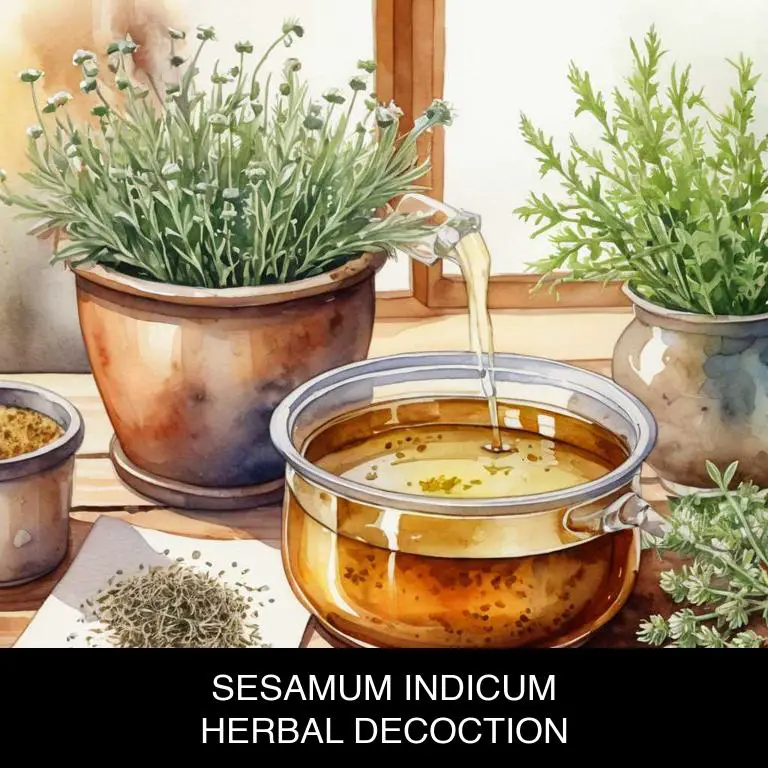
Medicinal Constituents
The list below shows the primary medicinal constituents in Sesamum indicum decoctions that help with oily hair.
- Sesamin: Sesamin has been shown to have antifungal and antibacterial properties, which can help reduce scalp infections and inflammation that may contribute to oily hair.
- Sesamolin: Sesamolin, a lignan, has been found to have antioxidant and anti-inflammatory properties, which can help soothe and calm the scalp, reducing the production of sebum and leading to less oily hair.
- Fatty acids: Sesame oil is rich in fatty acids, particularly oleic acid, which can help balance the skin's natural oil production, regulate sebum production, and reduce the appearance of oily hair.
Parts Used
The list below shows the primary parts of sesame used to make decoctions for oily hair.
- Seeds: Rich in antioxidants and natural oils that help balance and control oil production in the scalp.
- Leaves: Known for their astringent and antiseptic properties, which help reduce oil secretion and purify the scalp.
- Buds: Contain anti-inflammatory compounds that soothe and calm the scalp, reducing oiliness and promoting healthy hair growth.
Quick Recipe
The following recipe gives a procedure to make a basic sesame for oily hair.
- Gather 20 grams of dried sesamum indicum flowers and store them in an airtight container.
- Boil 1 liter of water in a saucepan and reduce heat to a simmer for 5 minutes.
- Add the dried sesamum indicum flowers to the boiling water and steep for 10 minutes.
- Strain the mixture through a cheesecloth or fine mesh into a separate container.
- Allow the decoction to cool completely before storing it in the refrigerator for up to 3 days.
2. Aloe vera
Aloe decoctions helps with oily hair because its natural compounds, such as aloin and aloe-emodin, work to balance the scalp's oil production.
The anti-inflammatory properties of aloe vera soothe the scalp, reducing irritation that can cause excessive oil secretion. Additionally, aloe's humectant qualities help to absorb excess moisture, leaving hair feeling lighter and less greasy.
Regular use of herbal aloe decoctions can help regulate sebum production, leading to a healthier, more manageable mane with reduced oiliness.
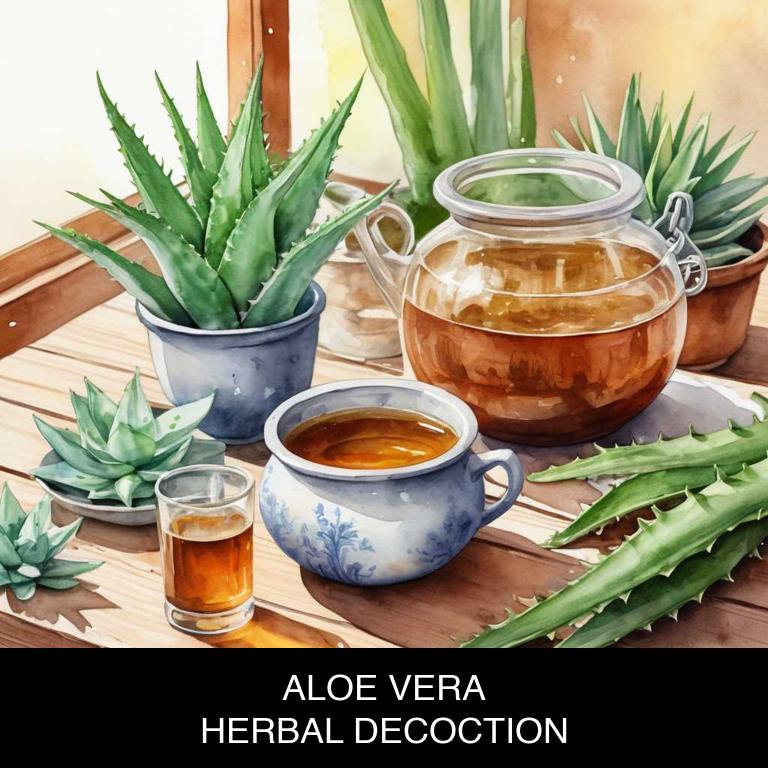
Medicinal Constituents
The list below shows the primary medicinal constituents in Aloe vera decoctions that help with oily hair.
- Aloin: Aloin, a glycoside found in Aloe vera, helps with oily hair by reducing the production of sebum, thereby controlling oiliness and scalp irritation.
- Furanocoumarins: Furanocoumarins, a class of phenolic compounds in Aloe vera, possess astringent and anti-inflammatory properties, which help to balance the scalp's pH and reduce excessive oil production.
- Saponins: Saponins, a type of triterpenoid, aid in reducing the oiliness of hair by creating a cleansing effect on the scalp and helping to remove excess sebum and other impurities.
Parts Used
The list below shows the primary parts of aloe used to make decoctions for oily hair.
- Leaves: The most commonly used part, rich in aloe vera gel, which helps to balance the scalp's pH and reduce oil production.
- Seeds: Used in decoctions to help reduce oiliness by removing excess sebum and promoting a healthy scalp.
Quick Recipe
The following recipe gives a procedure to make a basic aloe for oily hair.
- Harvest fresh aloe vera leaves from a mature plant by selecting thick fleshy leaves for optimal potency.
- Wash the harvested aloe vera leaves thoroughly with cold water to remove any dirt or debris.
- Chop the aloe vera leaves into small pieces and soak them in 500ml of distilled water for 30 minutes.
- Strain the mixture through a cheesecloth or a fine-mesh sieve into a clean container to separate the liquid from solids.
- Store the herbal aloe vera decoction in a dark glass bottle in the refrigerator for up to 3 days.
3. Salvia officinalis
Sage decoctions helps with oily hair because its antiseptic and astringent properties help to control excess oil production, reducing greasiness and impurities on the scalp.
The herb's natural ability to balance pH levels also helps to normalize sebum production, leaving hair looking healthy and manageable.
Additionally, sage's antibacterial properties combat dandruff and other scalp irritations, promoting a clean and refreshed scalp that absorbs less oil, resulting in healthier-looking locks.
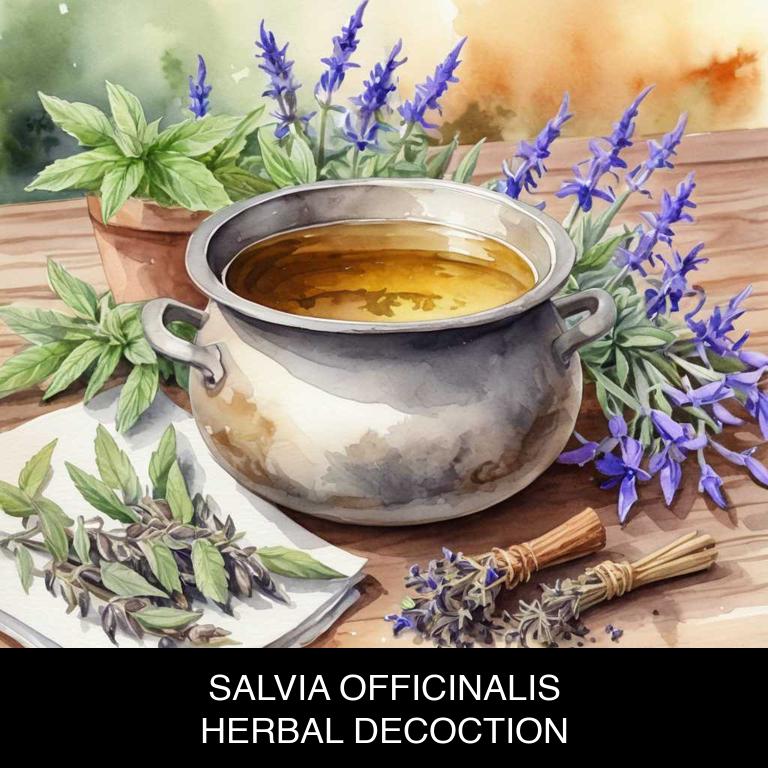
Medicinal Constituents
The list below shows the primary medicinal constituents in Salvia officinalis decoctions that help with oily hair.
- Rosmarinic acid: A phenolic compound that helps reduce sebum production in the scalp, thereby controlling oily hair.
- Ursolic acid: A triterpene that possesses anti-inflammatory properties, which can help alleviate scalp irritation and reduce oil production.
- Carnosic acid: A phenolic diterpene that has been shown to inhibit 5-alpha-reductase, an enzyme involved in sebum production, thereby reducing oily hair.
Parts Used
The list below shows the primary parts of sage used to make decoctions for oily hair.
- Leaves: The leaves of Salvia officinalis are used to make decoctions for oily hair due to their astringent properties, which help to balance the scalp's pH and reduce oil production.
- Stems: The stems of Salvia officinalis are used to make decoctions for oily hair due to their ability to help reduce inflammation and promote a healthy scalp environment.
- Roots: The roots of Salvia officinalis are used to make decoctions for oily hair due to their diuretic properties, which help to regulate oil production and reduce excess moisture in the scalp.
Quick Recipe
The following recipe gives a procedure to make a basic sage for oily hair.
- Harvest 30-60 grams of fresh leaves or 15-30 grams of dried leaves from salvia officinalis plants.
- Chop the harvested leaves into small pieces to increase surface area for infusion.
- Combine the chopped leaves with 500 milliliters of boiling water in a heat-resistant container.
- Allow the mixture to steep for 10-15 minutes to enable extraction of active compounds.
- Strain the decoction through a cheesecloth or fine-mesh sieve to remove solids.
4. Urtica dioica
Stinging nettle decoctions helps with oily hair because of its natural astringent and anti-inflammatory properties.
The decoction can help to balance the scalp's natural pH, reducing oil production and controlling sebum secretion. Additionally, the stinging nettle's ability to tighten pores prevents excess oil from entering the scalp, resulting in a reduction of greasiness.
This natural treatment can also help to regulate the hair follicle's growth cycle, leading to healthier, less oily locks.
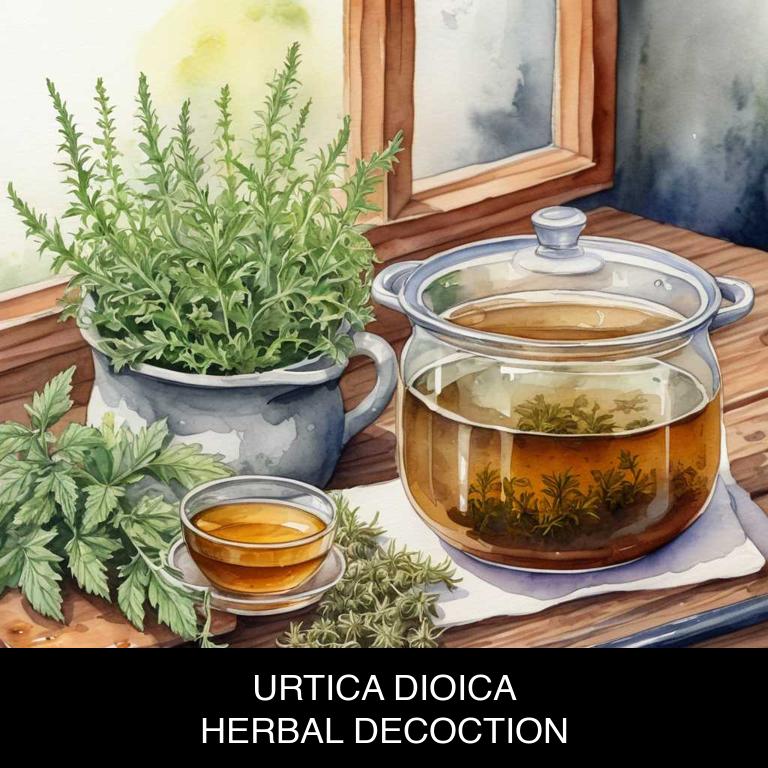
Medicinal Constituents
The list below shows the primary medicinal constituents in Urtica dioica decoctions that help with oily hair.
- Alkaloids: Alkaloids in Urtica dioica, such as histamine and tyramine, help regulate sebum production, reducing excessive oiliness in the hair and scalp.
- Flavonoids: Flavonoids, particularly quercetin, possess anti-inflammatory properties that help soothe and calm the scalp, reducing irritation and inflammation that can contribute to oily hair.
- Tannins: Tannins in Urtica dioica have astringent properties that help balance sebum production and reduce oiliness, leaving the hair looking healthier and more manageable.
Parts Used
The list below shows the primary parts of stinging nettle used to make decoctions for oily hair.
- Leaves: Rich in astringent and antiseptic properties, which help balance and clean the scalp.
- Stems: Contain urticine, which helps reduce oil secretion and soothe irritated scalps.
- Roots: Have astringent properties, which help tighten pores and reduce oiliness on the scalp.
Quick Recipe
The following recipe gives a procedure to make a basic stinging nettle for oily hair.
- Gather 20-30 grams of fresh or 10-15 grams of dried urtica dioica leaves and stems for decoction.
- Rinse the urtica dioica leaves and stems with cold water to remove any dirt or debris.
- Combine the cleaned urtica dioica with 1 liter of water in a saucepan and bring to a boil.
- Reduce heat to low and simmer the decoction for 5-10 minutes to release its active compounds.
- Strain the decoction through a cheesecloth or a fine-mesh sieve into a clean container.
5. Rosmarinus officinalis
Rosemary decoctions helps with oily hair because it stimulates blood flow to the scalp, reducing excess oil production.
The antifungal and antibacterial properties of rosemary also help control yeast overgrowth on the scalp, which can contribute to oiliness. Additionally, rosemary's ability to balance the scalp's natural pH levels helps regulate sebum secretion, resulting in a reduction of oiliness and a healthier scalp overall.
By using rosemary decoctions as a hair rinse, individuals with oily hair can achieve a cleaner, fresher, and more manageable mane.
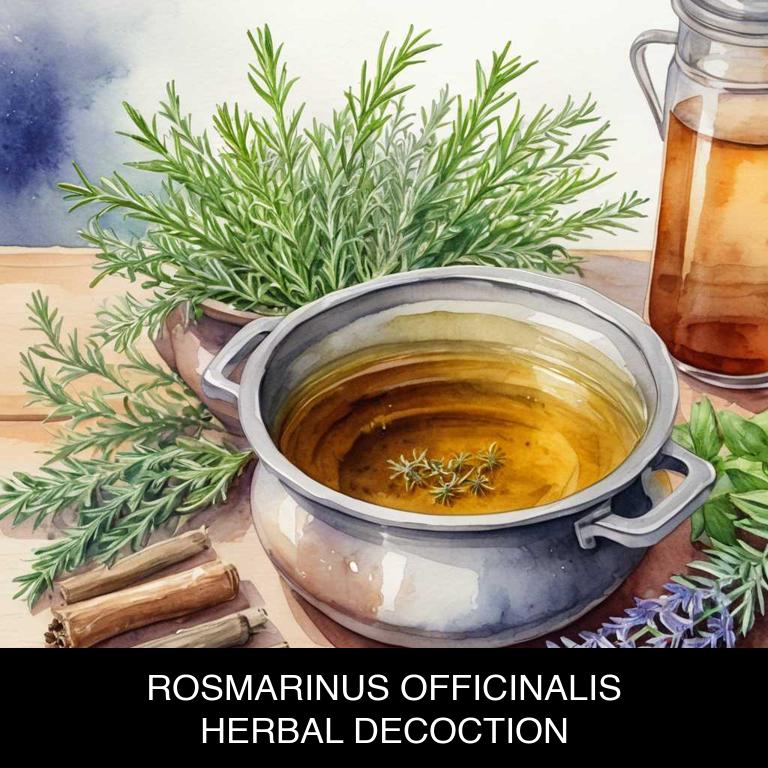
Medicinal Constituents
The list below shows the primary medicinal constituents in Rosmarinus officinalis decoctions that help with oily hair.
- Rosmarinic acid: A phenolic compound that helps reduce sebum production, thereby minimizing the oily appearance of hair.
- Carnosic acid: A diterpene that has been shown to reduce sebum production and inhibit the growth of bacteria that contribute to scalp irritation and oily hair.
- Caryophyllene: A sesquiterpene that has anti-inflammatory and antimicrobial properties, which can help soothe an itchy scalp and reduce oil production.
Parts Used
The list below shows the primary parts of rosemary used to make decoctions for oily hair.
- Leaves: Rich in essential oils, particularly rosmarinic acid, which helps to balance the scalp's pH and reduce oil production.
- Flowers: Contain antifungal and antibacterial properties, which help to control the growth of scalp bacteria that can contribute to oily hair.
- Stems: A source of antioxidants and rosmarinic acid, which can help to soothe and balance the scalp, reducing oil production and promoting healthy hair growth.
Quick Recipe
The following recipe gives a procedure to make a basic rosemary for oily hair.
- Gather 20-30 grams of dried rosmarinus officinalis leaves and flowers and store them in an airtight container.
- Measure 200 milliliters of water and pour it into a small saucepan or teapot.
- Combine the rosmarinus officinalis leaves and flowers with the water and bring the mixture to a boil.
- Reduce the heat to a simmer and let the mixture steep for 10-15 minutes.
- Strain the decoction through a cheesecloth or a fine-mesh sieve into a clean container.
6. Lavandula angustifolia
English lavender decoctions helps with oily hair because it has natural astringent and antiseptic properties that help to balance the scalp's natural oils.
The decoction's gentle, soothing nature calms irritation and reduces oil production, while its antibacterial properties combat any underlying infections or fungi that may be contributing to excess oil.
Additionally, lavender's antioxidant-rich compounds help to detoxify the scalp and promote healthy hair growth, leaving locks feeling clean, balanced, and manageable.
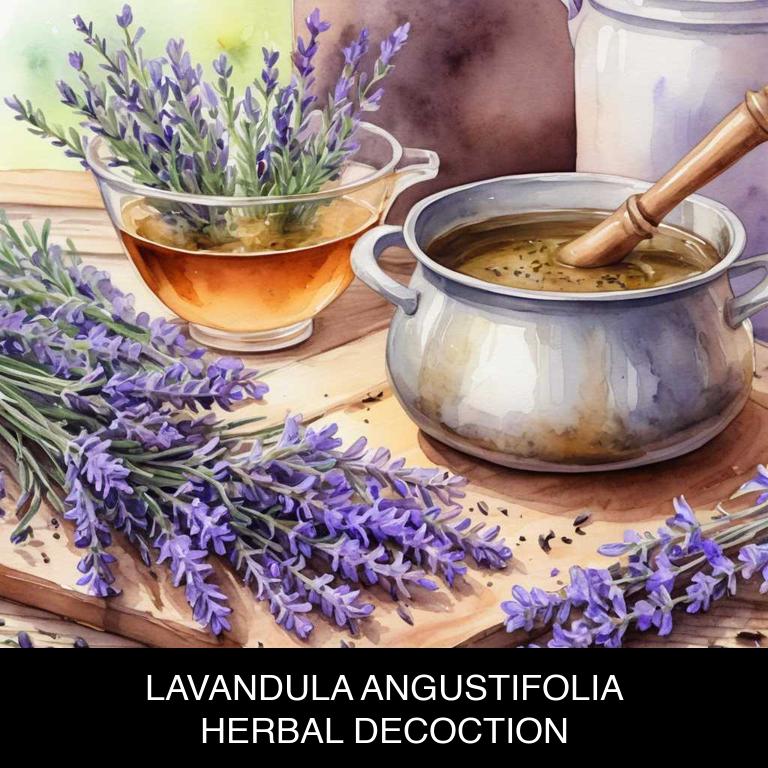
Medicinal Constituents
The list below shows the primary medicinal constituents in Lavandula angustifolia decoctions that help with oily hair.
- Linalool: This terpene has astringent and antiseptic properties, which help to reduce oil production in the scalp, thus controlling oily hair.
- Linalyl acetate: This terpene has a balancing effect on the scalp's natural oil production, promoting a healthy balance of oil and reducing excessive oiliness.
- Lavandulol: This terpene has antiseptic and anti-inflammatory properties, which help to soothe and calm the scalp, reducing irritation and oil production that can contribute to oily hair.
Parts Used
The list below shows the primary parts of english lavender used to make decoctions for oily hair.
- Leaves: Their astringent and antiseptic properties help to balance and purify the scalp, reducing oil production.
- Flowers: Their antifungal and antibacterial properties help to control scalp infections and reduce dandruff associated with oily hair.
- Stems: Their antiseptic and astringent properties help to tighten the hair follicles and reduce excessive oil secretion.
Quick Recipe
The following recipe gives a procedure to make a basic english lavender for oily hair.
- Gather 1 to 2 teaspoons of dried lavandula angustifolia flowers and store them in a clean container.
- Boil 8 ounces of water in a saucepan and let it simmer for 5 to 10 minutes.
- Add the dried lavandula angustifolia flowers to the boiling water and steep for 5 to 10 minutes.
- Strain the mixture using a fine mesh sieve or cheesecloth and discard the solids.
- Allow the decoction to cool down to room temperature before transferring it to a storage container.
7. Melissa officinalis
Lemon balm decoctions helps with oily hair because of its natural antiseptic and anti-inflammatory properties.
The astringent qualities of lemon balm help to balance the scalp's natural oil production, reducing excess sebum secretion and soothing irritated skin. This can lead to a decrease in oiliness and an improvement in overall hair texture. Additionally, lemon balm's ability to calm and purify the scalp can help to reduce dandruff and other scalp conditions that can contribute to oily hair.
Regular use of a lemon balm decoction as a hair rinse can leave hair looking healthier and more manageable.
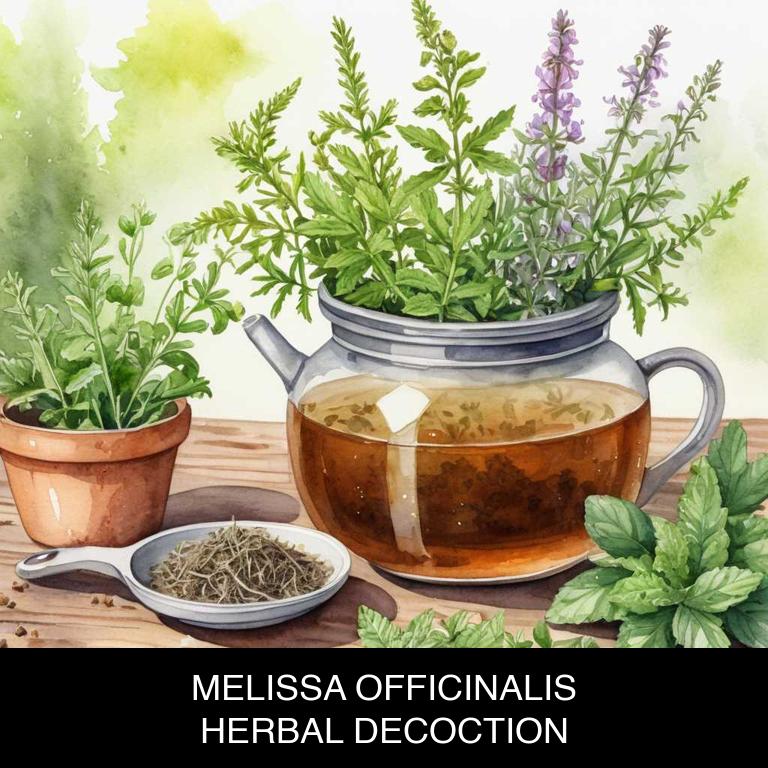
Medicinal Constituents
The list below shows the primary medicinal constituents in Melissa officinalis decoctions that help with oily hair.
- Rosmarinic acid: A phenolic compound that helps to reduce sebum production and prevent the buildup of oil on the scalp, thereby controlling oily hair.
- Linalool: A terpene that has antimicrobial properties, which helps to reduce the growth of bacteria that can contribute to oily hair and dandruff.
- Limonene: A terpene that has antiseptic properties, which helps to purify the scalp and reduce inflammation, leading to a reduction in oily hair.
Parts Used
The list below shows the primary parts of lemon balm used to make decoctions for oily hair.
- Leaves: They are used due to their astringent and antiseptic properties, which help to balance the scalp's pH and reduce oil production.
- Stems: They contain bioactive compounds that help to purify the scalp, reduce inflammation, and control sebum production.
- Buds: They are used due to their ability to regulate the scalp's oil production, reduce inflammation, and promote a healthy scalp environment.
Quick Recipe
The following recipe gives a procedure to make a basic lemon balm for oily hair.
- Harvest fresh melissa officinalis leaves and flowers from a well-tended garden in the morning.
- Combine 1 tablespoon of dried melissa officinalis leaves and flowers with 1 quart of boiling water.
- Steep the mixture for 5 to 7 minutes to release the active compounds.
- Strain the decoction using a cheesecloth or fine-mesh sieve into a clean container.
- Store the decoction in the refrigerator for up to 3 days before consumption.
8. Taraxacum officinale
Dandelion decoctions helps with oily hair because it has natural astringent properties that help to balance the scalp's oil production.
The antioxidants present in dandelion also reduce inflammation and purify the blood, which in turn reduces sebum production and regulates hair's natural moisture levels. Additionally, dandelion's diuretic properties help to flush out toxins and excess water from the scalp, leaving hair looking healthy, shiny, and manageable with a reduced oiliness.
This results in a healthier and more balanced scalp, reducing the need for frequent washing and styling products.

Medicinal Constituents
The list below shows the primary medicinal constituents in Taraxacum officinale decoctions that help with oily hair.
- Apolypodins: Apolypodins have been found to have anti-inflammatory properties, which can help reduce the inflammation in the scalp that can contribute to oily hair.
- Taraxasterol: Taraxasterol is a triterpenoid saponin that has been shown to have astringent properties, which can help balance the scalp's natural oil production and reduce the appearance of oily hair.
- Taraxasterol acetate: Taraxasterol acetate is another triterpenoid saponin found in Taraxacum officinale that has been reported to have antiseptic and anti-inflammatory properties, which can help soothe and calm the scalp, reducing the likelihood of oily hair.
Parts Used
The list below shows the primary parts of dandelion used to make decoctions for oily hair.
- Roots: Used due to their high content of inulin, a natural polysaccharide that helps to balance the scalp's oil production.
- Leaves: Employed for their astringent and antiseptic properties, which help to regulate the scalp's sebum production and reduce inflammation.
- Seeds: Utilized for their diuretic and detoxifying effects, which aid in removing excess oils and toxins from the scalp.
Quick Recipe
The following recipe gives a procedure to make a basic dandelion for oily hair.
- Harvest taraxacum officinale roots and leaves in the early morning when moisture is minimal.
- Wash the harvested parts with clean water to remove dirt and debris thoroughly.
- Chop 20 grams of the washed taraxacum officinale parts into small pieces for easier infusion.
- Combine the chopped taraxacum officinale pieces with 500 milliliters of cold water in a saucepan.
- Simmer the taraxacum officinale mixture over low heat for 15 to 30 minutes slowly.
9. Camellia sinensis
Tea decoctions helps with oily hair because they work to balance the scalp's natural oil production.
Herbal teas like peppermint, chamomile, and green tea contain antifungal and antibacterial properties that help control the growth of bacteria and fungi on the scalp, which can contribute to oiliness. Additionally, the astringent properties in these teas help to tighten pores and reduce excess sebum production, leaving hair looking healthy, manageable, and less greasy.
Regular use of herbal tea decoctions as a pre-shampoo treatment or as an after-shampoo rinse can help maintain a balanced scalp and hair.
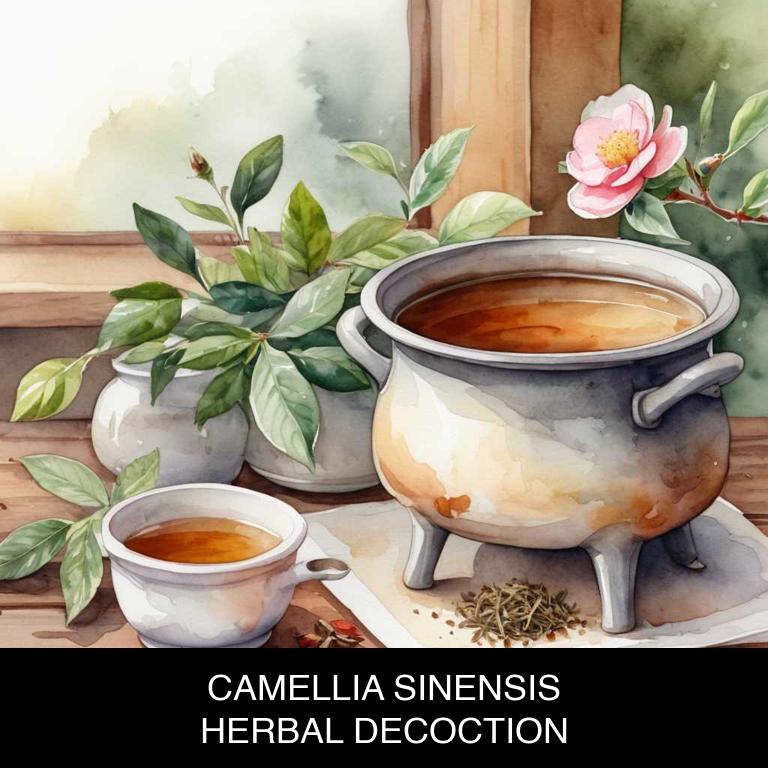
Medicinal Constituents
The list below shows the primary medicinal constituents in Camellia sinensis decoctions that help with oily hair.
- Catechins: Catechins, particularly epigallocatechin gallate (EGCG), help to reduce oil production by inhibiting the activity of enzymes involved in the formation of sebum, thus controlling oily hair.
- Theaflavins: Theaflavins, derived from the fermentation of catechins, exhibit anti-inflammatory and antioxidant properties, which help to soothe and balance the scalp, reducing the production of excess oil that contributes to oily hair.
- Quercetin: Quercetin, a flavonoid present in Camellia sinensis, has been shown to regulate sebum production by modulating the expression of genes involved in the development and maintenance of the sebaceous glands, thereby helping to control oily hair.
Parts Used
The list below shows the primary parts of tea used to make decoctions for oily hair.
- Leaves: Astringent properties in the leaves help balance the scalp's oil production and reduce sebum.
- Buds: The buds' antioxidant and antimicrobial properties can help control oil production and soothe an oily scalp.
- Roots: The roots' astringent and antiseptic properties can help balance the scalp's oil production and reduce inflammation.
Quick Recipe
The following recipe gives a procedure to make a basic tea for oily hair.
- Choose 10-20 grams of dried camellia sinensis leaves per 1 liter of water for a standard decoction.
- Rinse the dried leaves with water to remove any impurities and debris.
- Combine the leaves with 1 liter of boiling water in a heat-resistant container.
- Allow the mixture to steep for 5-10 minutes to release the herbal properties.
- Strain the decoction through a fine-mesh filter to remove the leaves and serve.
10. Calendula officinalis
Pot marigold decoctions helps with oily hair because of its natural astringent and antibacterial properties.
The decoction helps to balance the scalp's natural pH, reducing oil production and absorption. It also contains antioxidants that soothe and calm irritated scalps, which can contribute to excessive oiliness. Additionally, pot marigold has anti-inflammatory properties that help to reduce redness and itchiness, promoting a healthy scalp environment that is less prone to oily hair.
By incorporating this natural remedy into your hair care routine, you can say goodbye to greasy locks and hello to a balanced, manageable mane.
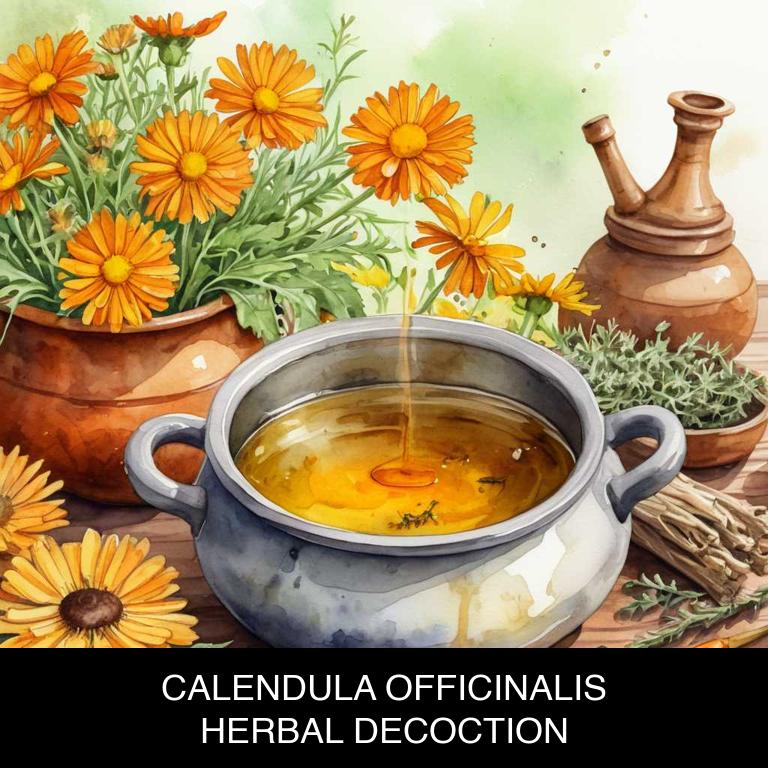
Medicinal Constituents
The list below shows the primary medicinal constituents in Calendula officinalis decoctions that help with oily hair.
- Flavonoids: These plant-derived compounds help to reduce oil production in the scalp by inhibiting the activity of sebum-producing glands.
- Sesquiterpenes: These compounds have anti-inflammatory and antimicrobial properties, which may help to control the growth of bacteria and fungi that contribute to oily hair and scalp conditions.
- Saponins: These natural foaming agents can help to balance the scalp's pH, reduce oiliness, and promote a healthy scalp environment.
Parts Used
The list below shows the primary parts of pot marigold used to make decoctions for oily hair.
- Flowers: They are rich in antioxidants and anti-inflammatory properties, helping to balance the scalp's pH and reduce oil production.
- Leaves: They contain salicylic acid, which helps to exfoliate the scalp, reduce sebum production, and prevent clogged pores.
- Seeds: They are a natural astringent, helping to tighten the hair follicles and reduce oiliness, while also providing antioxidant benefits.
Quick Recipe
The following recipe gives a procedure to make a basic pot marigold for oily hair.
- Gather 20 grams of dried calendula flowers and store them in a cool dark place for later use.
- Combine the dried calendula flowers with 1 liter of boiling water in a heat-resistant glass container.
- Steep the mixture for 10 to 20 minutes or until the liquid has cooled to room temperature.
- Strain the mixture through a cheesecloth or a coffee filter into a separate container.
- Discard the solids and transfer the liquid decoction to a glass bottle for storage in the refrigerator.
What is the best combination of herbal decoctions to use for oily hair?
The best combination of herbal decoctions that help with oily hair is a blend of neem, tea tree, and sage.
Neem helps control dandruff and reduces oil production, while tea tree oil's antifungal and antibacterial properties balance the scalp. Sage decoction stimulates blood flow, promoting healthy hair growth and reducing oiliness. To use, combine equal parts of each decoction and apply as a final rinse after shampooing.
Leave on for 5-10 minutes before rinsing with cool water for optimal results.
What ailments similar to oily hair are treated with herbal decoctions?
Ailments similar to oily hair that are treated with herbal decoctions are acne, eczema, and hyperpigmentation.
These conditions share similarities with oily hair in terms of excess sebum production and skin irritation.
Herbal decoctions like neem, turmeric, and tea tree have anti-inflammatory and antibacterial properties that help to reduce inflammation, balance skin pH, and eliminate bacteria that contribute to these conditions.